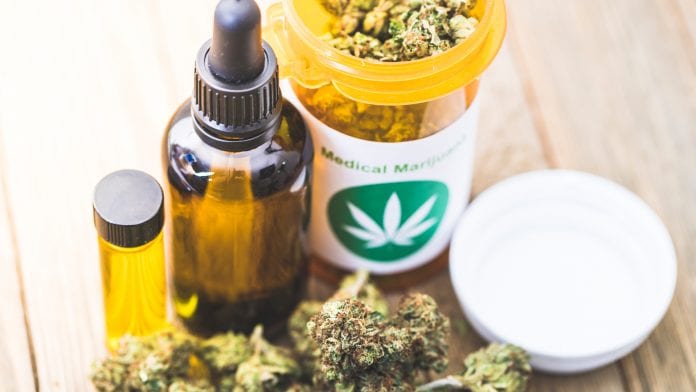
Medical Cannabis Network spoke to the first patient in Australia to receive a medical cannabis prescription, Jason Jordan, about his experience with cannabis and multiple sclerosis.
In the UK cannabis oil was approved last year by NICE for two conditions – epilepsy and multiple sclerosis. In Australia a multiple sclerosis patient, Jason Jordan, was the first to receive a medical cannabis prescription in the country for his condition.
Multiple sclerosis, or MS, is a lifelong condition caused by unknown factors that impacts the spinal cord and brain. There are a number of symptoms associated with the condition including muscle spasming, vision and sensation problems, and balance problems, which cannabis can help to dramatically improve.
Medical Cannabis Network editor, Stephanie Price, spoke to Jason Jordan, of Medical Cannabis Research Australia, to find out more about his experience with medical cannabis and multiple sclerosis, what the UK can learn from Australia and about the public’s changing attitudes to the medicine.
Can you tell us about your experience with MS?
The first indication that there was anything wrong with me would have been around about the age of 21 and that is only in retrospect.
At the time I had various symptoms, I was limping, I was getting around flat footed, people often thought I was drunk – this was while I was still at university. I saw a doctor a couple of times over various symptoms, but they usually put it down to a double ear infection or something similar.
I never had a lot of symptoms throughout most of my adult life, but I’ve never been the most co-ordinated person in the world, and I put that down to the MS as well. Multiple sclerosis has three main stages. It was about 10 years ago that I actually got properly diagnosed with the first type of multiple sclerosis, which was a relapsing remitting MS, meaning you get some symptoms, and then you get better.
Next, you move into what’s called secondary progressive multiple sclerosis in which you get symptoms and most of the deficits you accumulate, then you get what is called primary progressive multiple sclerosis. That is the point at which your deficits, once they come, they never go away.
So, I’d moved onto walking sticks, and as far as I knew at that point, this was going to be my life. The next step was that I was going to be in a wheelchair. I couldn’t speak properly; I was having brain fog and really bad confusion problems. It got to the point where I couldn’t drive anymore because it was dangerous, not just for me, but other people. I was becoming incontinent and there was all manner of bizarre sensations that are really hard to describe because they’re not normal as a result of your nerves being damaged, such as burning in your feet, or like they are in a bucket of ice.
How did your condition impact your life and career?
I built an IT company and had a lot of responsibility. I was at my peak; an alpha type personality driving the business hard and achieving so much. Then it hit me big time, taking the company away from me.
My symptoms were gradually getting worse. At the same time, one of the big things that I used to do over here in Australia is media appearances for questions around technology. If the media wanted to know about a new virus doing the rounds, or wanted to talk about cyber security, I was the person they would come to.
The moment I started having problems thinking straight, as well as not being able to speak properly, I had to stop all of that. So, I went from doing all of this to nothing overnight, and that was devastating. I had to completely start reassessing my whole life.
How did you come to use medical cannabis?
Thankfully, I had a really great neurologist, and he’s a bit of a black sheep because he tends to do things differently. He is more prepared to do things that aren’t conventional, especially when you’re getting to the point where you’re running out of options
for treatment.
I had gotten to the point where my last option was either an experimental medication that had a risk of massive brain infection or medical cannabis.
My initial response was no, absolutely not. It’s a gateway drug. I’m not interested in that.
I’ve got family members who have been on the wrong side of law as a result of drug use. The doctor said: “Jason I want you to go do some research and then get back in contact with me.” So, I did, and in 24 hours, I’d worked out that we’ve all been lied to.
It didn’t take long for me to discover that cannabis has been unfairly maligned for a long, long time, and that the history of cannabis goes back in excess of 11,000 years – they have found residual cannabis in the sarcophagi of ancient people. I thought to myself that if the human species has been using it for at least that length of time then if there was any definitive proof of this being harmful, it would have been produced by now, and it has not.
I decided to start the medical cannabis, and, within six weeks, I was halfway back to being normal.
Within three months, I would say that most people would look at me and not have any idea that I have multiple sclerosis. All of these issues will be for the rest of my life because my brain is physically damaged, and my body is doing its best to work around that. However, although, the medical cannabis is treating the bulk of the symptoms, it is not a cure.
One of the issues I had is that at one point, I wasn’t able to afford the medication, and so I stopped taking it for about a month. A lot of my symptoms started coming back. Straightaway I realised that, unfortunately now, I’m on this for life. I’ve experimented with dosage and have come to realise that there are no side effects whatsoever from it. It helps me sleep better, and so my question continues to be, what is the problem that some people and the media continue to have with medical cannabis?
My perspective on all this is that I’m out there battling to ease access to medical cannabis because I want other people to have the opportunity that I’ve had.
What is your experience with medical cannabis and multiple sclerosis?
If I took my full bottle of medical cannabis, that is a month’s worth of medication for me. I would sleep and wake up probably feeling hungry. That’s about it. That’s the only thing you could even remotely consider a side effect.
The way cannabis works, means that it doesn’t affect the brain stem, and it doesn’t affect your breathing. You can fall asleep, but you will not die. That is the message we need to get across to people. We are not talking about it for recreational use, and, even if somebody does get high from it, so what? Getting high is not a bad thing if it makes someone a more mellow, relaxed kind of person, and quality of life is improved as a result. That is a terrific thing, not a bad thing.
The whole point of medical cannabis is that we know the provenance of it. We know where it came from, we know how it was prepared, we know how it was grown, we know there is no heavy metals or pesticides or bacteria. We know that it hasn’t been stored in a way that causes mould in it.
If you look at me with MS, I have a compromised immune system, I can’t afford the risk of taking something that I don’t know where it came from or how it was grown. It is a proper medicine and I know that it is safe to take.
Do you speak to other people who have also had positive experiences with medical cannabis?
In January 2019 I became director of Medical Cannabis Research Australia, which is a registered charity and our mission is to educate, advocate, and research.
First of all, we advocate to Bureaucrats, Politicians and the Medical Fraternity, but we also advocate on behalf of patients who are either too sick or too shy to actually get out there and fight the battle themselves. Regarding research, what we do is initiate and fund research into medical cannabis.
This work has allowed me to meet so many people with similar stories to me. I have met people who have MS, people who have chronic pain and arthritis in particular is very common. I have also met a couple of children with intractable drug resistant epilepsy who are seeing a massive benefit.
I have met a couple of people who have dementia, and I’ve met one man in particular who has Parkinson’s. The best part of this work is watching someone try medical cannabis for the first time and seeing the effect it has on them.
What’s the framework for medical cannabis in Australia and what can the UK learn from countries like Australia and Canada?
The Therapeutic Goods Administration (TGA) are the body that administrates, unregulated and scheduled drugs, and they are the ones that doctors have to seek approval from to be able to prescribe.
We are about two years behind Canada in Australia in terms of legislation, and the UK is two years behind Australia. The one good thing that the UK does have is that CBD is considered to be a food supplement and can be purchased over the counter.
The big problem with that is that it is essentially unregulated, meaning you don’t know the quality of the product that you get. People buying CBD from vape shops or the high street don’t know for sure that it is legitimate. It might not have any CBD in it, or it might actually have THC in it as well. People have got to be really careful.
So, what can people in the UK do to fast track all of this to the point we are at in Australia now? People need to vote with their wallets.
People who need medical cannabis should ask their doctor if they can try it and if they shut you down or say no, go and see another doctor. That’s not doctor shopping, that’s simply finding another doctor who is better educated.
How does education lead to changing perspectives?
I believe that if someone is passionate about medical cannabis they should write a letter to the editor of their local newspaper or call up their local talkback radio station. Part of what needs to be done is to reduce the stigma attached to the word “cannabis”.
I think the important point to make is that I, like many other people who are now on medical cannabis, was very resistant to it. I was because I had been brought up to believe that cannabis is bad and dangerous. After doing some research and speaking to some experts like my neurologist, I discovered that we had been lied to. I realised that the dangers of cannabis are way over exaggerated, and the benefits of cannabis massively outweigh any risks.
At a minimum, people need to educate themselves and then just try it, and if it has a benefit, that is wonderful. If it doesn’t you can move on to the next thing. I think it’s super important that people understand cannabis isn’t just for “stoners”.
Jason Jordan
Medical Cannabis Research Australia
jason.jordan@mcra.org.au
This article appeared in the first issue of Medical Cannabis Network which was out in January. Click here to subscribe.










It was diagnosed 35 years ago and had my very first notable MS attack but had the exact same type of attack 7 years before that. I am 67 now. I managed to get off of all headache pills with help of CBD oil from the USA but they won’t sell to Canada so now I am trying products here in our Country but so far nothing works like the Kannaway am & pm Revieve worked for me! I pray one day they will sell to Canada. After all Marijuana is legal in Canada now! Anyone have any idea how I can get that product ever again???
I have multiple scoliros . other medications.made me sick.i want to get medical treatment.